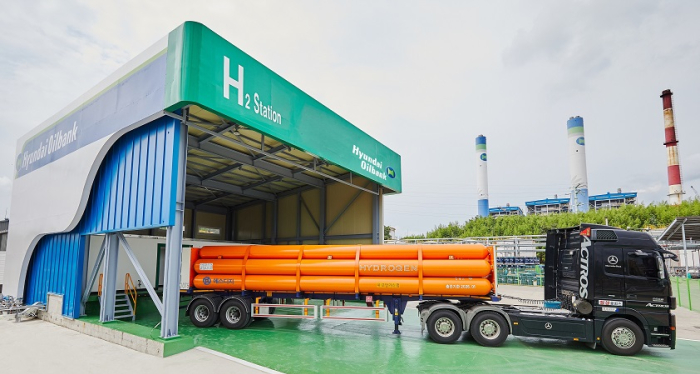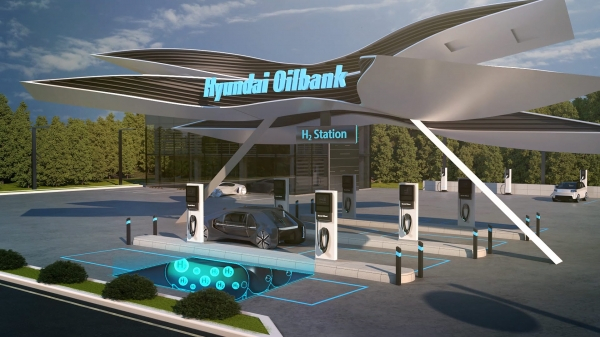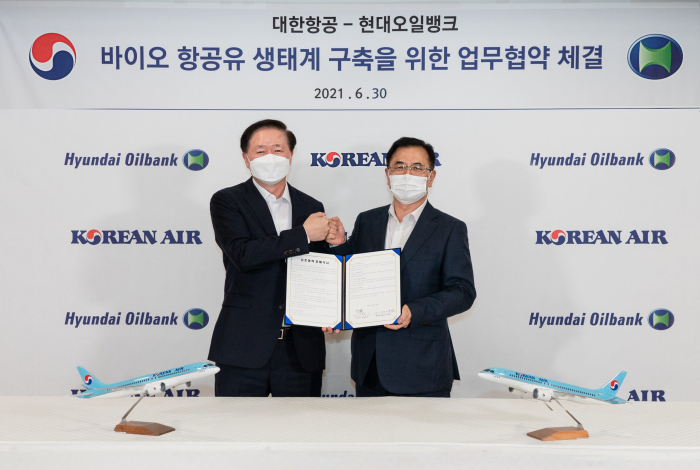Hydrogen economy
Hyundai Oilbank to make hydrogen fuel cell components from 2023
Blue hydrogen, white biotechnology and eco-friendly materials will be the oil company's three strategic areas
By Aug 26, 2021 (Gmt+09:00)
3
Min read
Most Read
Samsung shifts to emergency mode with 6-day work week for executives


Alibaba eyes 1st investment in Korean e-commerce platform


Blackstone signs over $1 bn deal with MBK for 1st exit in Korea


NPS loses $1.2 bn in local stocks in Q1 on weak battery shares


OCI to invest up to $1.5 bn in MalaysiaŌĆÖs polysilicon plant



Hyundai Oilbank Co. will enter the hydrogen fuel cell components market by building separator production plants within this year with commercialization goals by 2023.
The oil refining unit of the Hyundai Heavy Industries Group said on Aug. 26 that it will establish a full-fledged value chain of hydrogen fuel cell components, starting with the production of separators from 2023 and expanding into electrolyte membranes and other parts in the long run.
Since last year, Hyundai Oilbank has been conducting in-depth technical and business research on hydrogen fuel cells for electric vehicles (EVs). The oil company said that its top management in January this year decided to enter the market after a thorough review of industry and environmental policy trends in major countries around the world. A lower entry barrier than the EV battery market was another decisive factor, added Hyundai Oilbank.
The first phase in setting up the hydrogen value chain will center around the separator business. The separator is a key component of the hydrogen fuel cell stack. It serves as a channel for supplying hydrogen to the anode and oxygen to the cathode, and also functions as support between unit cells constituting the stack.
The company will complete construction of the separator production facilities and run pilot tests within 2021, conduct demonstrations with domestic automakers in 2022 and fully commercialize the products by 2023.
In the second phase, Hyundai Oilbank will start manufacturing electrolyte membranes. In the longer term, the company will also review potential entries to gas diffusion layers (GDLs), electrolyte separator plates and fuel cell systems for heavy equipment.
Hyundai Oilbank said it plans to generate an annual operating profit of 100 billion won ($85.5 million) on revenue of 500 billion won ($427.7 million) in the hydrogen fuel cell sector by 2030.
The company will also start producing high-purity hydrogen for vehicles, the first case among the oil companies in South Korea. Hyundai Oilbank said it has already set up facilities within the Daesan Plant located in South Chungcheong Province to produce hydrogen with 99.999% purity.

Hyundai OilbankŌĆÖs announcement to produce high-purity hydrogen is part of the groupŌĆÖs long-term hydrogen strategy. Hyundai Heavy Industries Group in March had announced a 2030 hydrogen roadmap that encompasses storage, logistics and application of hydrogen. Insiders note that Hyundai OilbankŌĆÖs current daily capacity of high-purity hydrogen production is 3 tons, enough to fully charge 600 Hyundai Nexo vehicles. ┬Ā
Hyundai Oilbank will also build 180 hydrogen charging stations across South Korea by 2030. The company also signed an MOU in May with Korea South-East Power Co., a wholly-owned subsidiary of Korea Electric Power Corporation (KEPCO) to manufacture and supply hydrogen for power generation. ┬Ā
According to a recent report by the Export-Import Bank of Korea, the global hydrogen fuel cell market will grow at an annual rate of 30% to reach 50 trillion won ($43 billion) by 2030. While South KoreaŌĆÖs hydrogen fuel cell products are regarded as globally competitive, the manufacturers in the country are still relying heavily on imports of some key components including electrolyte membranes and GDLs.

ŌĆ£Our company has recently kicked off a series of new businesses including solar panel materials, biofuels for aviation as well as carbon capture and storage. We will continue to expand investments in the three key strategic areas of blue hydrogen, white biotechnology and eco-friendly materials,ŌĆØ said Hyundai Oilbank CEO Kang Dal-ho.
Write to Jung-hwan Hwang at jung@hankyung.com
Daniel Cho edited this article.
More to Read
-

-
 IPOsHyundai Oilbank revives IPO push, expands blue hydrogen business
IPOsHyundai Oilbank revives IPO push, expands blue hydrogen businessJun 15, 2021 (Gmt+09:00)
2 Min read -
 HydrogenHyundai Oilbank, Air Products sign MOU to make hydrogen
HydrogenHyundai Oilbank, Air Products sign MOU to make hydrogenApr 06, 2021 (Gmt+09:00)
1 Min read -
 Saudi Aramco agrees to buy $1.6 bn stake in Hyundai Oilbank
Saudi Aramco agrees to buy $1.6 bn stake in Hyundai OilbankJan 30, 2019 (Gmt+09:00)
2 Min read
Comment 0
LOG IN


